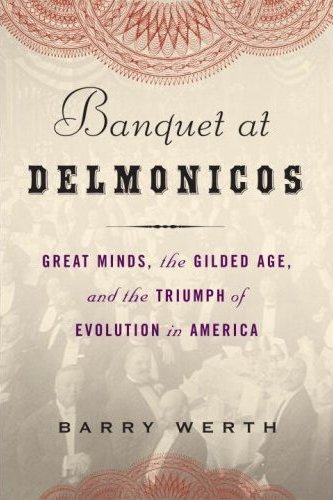
Banquet at Delmonico’s: Great Minds, the Gilded Age, and the Triumph of Evolution in America
by Barry Werth
Barry Werth’s rich narrative of science and philosophy in the Gilded Age certainly seems to take place in a different America: when intellectuals were reporter-hounded celebrities, and when evolution came to be seen as the finest expression of a divine power, not its contradiction.
The intellectuals are the main characters in Werth’s engrossing tale. They move from city to city, giving speaking tours to adoring crowds and gathering in salons and dining rooms – culminating in the title banquet of Werth’s tale, a feast of oysters, venison and speech-making that saw the uniting of science, philosophy and religion to affirm America’s rise to world leadership.
Towering above the rest in Werth’s book are Charles Darwin and Herbert Spencer, two Brits who, thanks to their tireless American supporters Asa Gray and Edward Livingston Youmans, respectively, became widely famous in the country. (It helped, too, that the most prominent anti-evolution scientist died rather early.)
But it was Spencer’s application of Darwin’s theory to societies and men – he argued that societies evolve toward an ideal, and that the best men thrive – that won the imaginations of imperialists and industrialists everywhere, who used the theory to justify their ambitions and their prejudices. Darwin profoundly disagreed with Spencer’s theory but he couldn’t match Spencer’s fame – he never came to the U.S., and he died when Spencer’s star began its highest climb, shortly before his American tour and before the title banquet.
Werth follows the gradual acceptance and application of Spencer’s theories in the U.S. The most prominent Spencer acolyte might have been one Andrew Carnegie. He applied Spencer’s theories to his business decisions as he built his empire, believing, for instance, that iron would yield to steel “like natural species competing for survival.” He successfully sold his mammoth steel and iron company – after failing to create what Werth kindly terms a “pool” between himself and his rivals – and went on, of course, to give his money away, primarily for educational purposes. (Other Spencerians, as Werth shows, would disagree with the need to improve the lot of the less fit.) Carnegie had one occasion to meet Spencer one-on-one, on a transatlantic boat trip to the U.S., a coming together, as Werth writes, of “master and acolyte, theorist and practitioner.” The two shared a meal during which Spencer, characteristically, made a fuss about being served the wrong cheese.
Small anecdotes like these make up the bulk of Werth’s saga; he avoids pausing for meta-comment on the battles of science, political philosophy and religion and their modern relevance, though he has every occasion to do so. The biggest anecdote of all is the concluding banquet, of course, where Spencer nervously botched his speech, baffling his guests by arguing that Americans shouldn’t work so hard (seemingly contradicting his own theory). One John Fiske, a Harvard lecturer, was the star of the night, for unifying evolution with religion and with the expanse of American power. The many applications of Spencer’s theory that came after that meal – justifying imperialist expansion and supporting eugenics – would not have been condoned by Spencer who, it seems, turned out to be fitter than his original idea. As Werth writes, Spencer unfortunately “outlived the era of competitive individualism he had helped define and inspire.”
Excerpt: “Former secretary of state and attorney general William Evarts, for whom Spencer was the smartest man alive, would preside. Elite politicians, jurists, publishers, religious leaders, scholars and industrialists including Carnegie would lean in eagerly from their seats to hear what he had to tell them. Spent and curdling in his room at the Windsor, Spencer doubted he could go on. At the defining, triumphal moment of his life’s journey, the peak of his influence, he was once again anxious, dilapidated, and frail – a ringing irony in that for thirty years he had expounded on how nature favored the strong and fit. But that was Spencer.”
Further Reading: Social Darwinism in American Thought and Evolution: The Triumph of an Idea




Send A Letter To the Editors